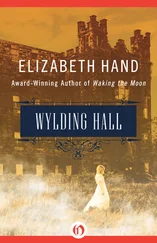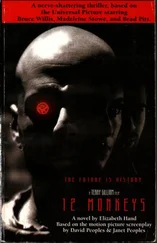A name: Justice. And another—
Aidan.
The name I had used in the City of Trees. But Justice was dead now, buried somewhere in the bowels of the Engulfed Cathedral along with Anna and Dr. Silverthom and all those other victims of the Mad Aviator. All of them dead, or imprisoned, except for myself and my two companions. But I felt as though I alone had survived, Wendy Wanders, Subject 117; no longer lovely or powerful, no longer safe within the citadel my mind had erected around itself since my tormented childhood.
Alone, alone, alone!
I wanted to shriek, recalling the Cathedral in flames, and the City itself like some lovely canvas, curled and blackened, burning, burning. All of it gone; all of them, even the Mad Aviator, dead.
But then I remembered what Giles had said.
“ It will be the best news we’ve had in a year if we knew him — if he’s really dead, as you say.”
I shivered, pulling the suede blouse to my chest. Impossible, of course. I had seen the Aviator fall, his face torn away by the impact from Jane’s pistol. And yet, and yet…
Grief turned to terror at the thought of Margalis Tast’annin, still alive somewhere; still searching for me. I forced myself to focus on something else—the kinetic sculpture’s monotonous dishabille, the clicks and whines from the castrato aria; my own voice chanting in another language.
And finally grief and terror gave way to a numbness, an utter exhaustion that was like a sort of joy. My head ached from crying, but the tears were gone now. Carefully I placed the suede blouse back upon the bed. Then I gathered my old clothes and brought them to the tiny fireplace. Piece by piece I fed them to the flames: trousers, blouse, belt, scarves. Thick foul smoke filled the room as the cloth danced upon the metal hearth, but I didn’t care. I waited until the flames died back, then, heedless of the pain, stuck my hand beneath the grate and drew back fingers smeared with hot ashes. When I rubbed them on my face, they tasted bitter and burned my tongue; but all I could think of was Justice burning, all I could wish was that these had been his ashes, that I might somehow have tasted his death.
It was Jane who found me there a little later. Naked, staring into the little fire grate like a dull child, my mouth smeared black, my hands filthy.
“Wendy,” she said gently. I wouldn’t look at her, but I could hear the heartbreak in her voice. “Oh, Wendy—”
She pulled me gently to my feet and helped me into the bathroom. There she washed my face and hands, dabbed at the wound on my cheek, and brought me the new clothes from the bed. Like a patient child she dressed me, saying little, rinsing my hair until it was free of soot and blood. Then she kissed me, her mouth lingering on my cheek, her lips parting the slightest bit so that I could feel her warm breath. When she lowered her face to kiss my hands, I saw the tears in her eyes.
“Oh, Wendy,” she whispered. I shut my eyes and breathed deeply, tried to bring up some image that might ease the pounding in my head; but found nothing but Justice’s face, pale and lifeless where he lay on the Cathedral’s stone floor.
“Go, please,” I said hoarsely. Jane’s hands slid from mine. I could hear her crossing the room, hear her pause at the door where I imagined her looking back at me, her brown eyes bright with tears. Then the door opened and shut, and I was alone once more.
Not long after that someone tapped gently at my door. “Dinner soon,” Trevor’s soft drawl came to me. “We’ll be downstairs.” I heard him pass to the next room and call to Miss Scarlet. I waited until his soft tread echoed on the steps again. Then, sighing, I walked to the mirror that hung near the door.
The new clothes did not suit me at all. Part of it was their anachronistic cut. No one wore skirts much anymore, neither men nor women. These obviously had been made for a woman, someone my own height but with wide hips and heavy breasts, the kind of woman the Paphians might name margravine at one of their masques. They were not clothes that became me. In my boy’s attire I had always looked beautiful, a tall, slender youth with tawny hair and gray eyes, too serious, perhaps, but with a softness about my mouth that had made me popular with my Paphian audiences.
All that was gone now. The Aviator’s words came back to me, when he had imprisoned me at the Cathedral—
“ Not so pretty as you were, Wendy Wanders …”
And it was true. My singed hair hung raggedly around my face; my face itself was gaunt and gray save where my cheek had been seared, and that livid scar glowed like the impression of some deathly kiss. My eyes were swollen, but that seemed almost a mercy—who could bear to look into those eyes now, that had seen such things? The blouse and skirt hung limply on me, neither too large nor too small but just wrong —clothes made for another kind of life than mine. Already I regretted burning my other things. I raised my hand to cover the reflection of my face, when another knock came at the door.
“Wendy?”
Miss Scarlet’s voice, hesitant and worried.
“I’m coming.” I turned, walking clumsily with the long skirts billowing about my bare legs. I refused to wear those woolen boots. They made me think of moujiks, sour-faced Balkhash peasants straining over their fields of soy and triticale.
“Dinner smells good, at least,” Miss Scarlet said as I joined her in the hall. Her voice had a sharp, forced brightness. I nodded silently, refusing to meet her eyes, and she tried another tack.
“There was a telefile in my room. And a dumbwaiter. And some kind of imaging mirror that showed what my insides looked like. What’s your room like?”
I shrugged. Miss Scarlet pursed her lips. “At least they gave you new clothes.”
I gave up and smiled wanly. “You, too.” It was impossible for me to be unkind to Miss Scarlet for long.
She ducked her head and did a little pirouette on the bare pine floor. Her clothes had obviously been made for a child, a boy probably—cheap cotton trousers and a too-small tunic that Miss Scarlet had belted with a remnant of her Winterlong finery. It was odd to see her dressed like that, with none of the elegance she usually affected. The tunic’s arms were too short, and her hands bristled at the end of them, thick with dark fur, her palms the color of an old-fashioned pencil eraser.
“Your shoes didn’t fit?” she asked. “Neither did mine—”
She stretched out one foot until her long toes curled around the banister at the head of the stairs. She looked over her shoulder at me and grinned, and for an instant I thought she was going to swing down, hand over hand. Instead she waited patiently until I reached the steps, and walked demurely at my side.
In the main corridor we found Jane. She had changed back into her own clothes, which looked so travel-worn and stained, I asked if she hadn’t been given new ones.
“I feel more comfortable this way,” she announced. “Look at these.” She pointed at the water-stained plaster wall where two paintings hung, side by side.
Flight! was the caption on one of them. It showed a terrified black-skinned woman clutching a bundle and stumbling down the embankment of a wide, furiously boiling river. At her heels a ravening mass of hounds slavered and howled, and in the background I could barely discern the hulking figure of a white man with a face as hideous as the hounds’. Upon closer investigation, the bundle the woman hugged to her proved to be an infant. It was a very old print, nearly as old as the house, I would guess, and like much else at Seven Chimneys could easily have belonged in one of the Curator’s museums.
Читать дальше












